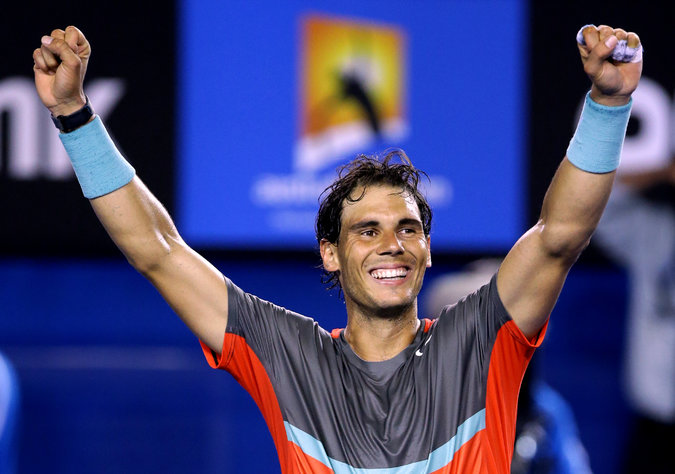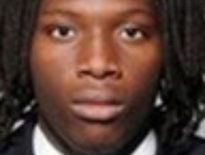MELBOURNE, Australia — For all of Roger Federer’s accomplishments, for the 17 Grand Slam singles titles and the 302 weeks spent atop the rankings, there remains one serious issue with his greatest-of-all-time résumé. That issue is Rafael Nadal.

As far as rivalries go, theirs is remarkably consistent, and has been for almost 10 years. Take Friday: Federer-Nadal, Match 33, in the semifinals of the Australian Open. As has been the case since 2007 whenever the two have squared off in Grand Slam tournaments, Nadal won, Federer lost, and the dialogue about their places in history shifted yet again.
The match played out with Nadal in front, with Nadal in control, with Nadal stinging Federer with backhands and slinging Federer around the court. For nearly two weeks now, Federer had played like the Federer of old — but Nadal beat that Federer, too, for the most part.
This installment ended after 2 hours 24 minutes. It was not particularly close, the final score 7-6 (4), 6-3, 6-3 in favor of Nadal. So continued the strangest thing about their rivalry, which ranks, oddly, among the most compelling and most lopsided in sports. In their 33 meetings, Nadal holds 23 wins, a roughly 70 percent success rate.
Nadal would be content with never answering another question about his ability to turn any version of Federer — the invincible Federer, the injured, the best, the greatest — into just another guy. But he took one Friday anyway. His answer was a roundabout route to “it is what it is.”
“The real thing is I played a lot of times against him,” Nadal said. “And a lot of times I played great against him.”
True on both counts, Friday included.
His latest triumph advanced Nadal into Sunday’s final, where he will face the second-best Swiss tennis player of this generation, after Federer. That is Stanislas Wawrinka, 28, a player now playing the best tennis of his life, a player who knocked out Novak Djokovic earlier this week and bested Tomas Berdych to reach his first Grand Slam final.
Federer, naturally, said he hoped that Wawrinka won. He said it without bitterness. He did not mean it as a swipe at Nadal. But no matter how he meant it, this particular final could hold great historical significance for Nadal and Federer.
If Nadal wins, he will become the first player in the Open era and the third ever to collect each major tournament trophy twice, further diminishing the argument that Nadal is simply a clay-court specialist. He would match Pete Sampras with 14 Grand Slam singles titles, second behind Federer.
Nadal now has nine victories over Federer in their 11 Grand Slam meetings. Because Nadal is an annual threat on the red clay at Roland Garros, Federer’s 17 major championships would seem well within reach.
That is why Friday’s match meant more than seemed possible at the outset. It was for a berth in the Australian Open final, but it was also about each player’s place in history, an argument that has shifted considerably in Nadal’s direction.
Federer remained pragmatic in his news conference. Rather than dwell on Nadal’s continued dominance, Federer focused on his other matches here in which, with his new coach Stefan Edberg and a larger racket head, he often looked like the invincible Federer again. Just ask Jo-Wilfried Tsonga or Andy Murray.
It was more difficult for Federer to explain why he struggled so with Nadal. He tried. To play Nadal, he said, was different from playing Djokovic or Murray. To beat Nadal, Federer could not play the way he wanted. He needed to be more aggressive, to hit at sharper angles, to take more risks.
His explanation was more fact than excuse. Nadal makes Federer play like someone else.
“I enjoy playing against him,” Federer said, a comment that all but begged for a lie-detector test.
Early Friday, Nadal said he had watched a recording of his 2012 victory over Federer in the semifinals here. He saw an aggressive Federer, and he expected the same again. Sure enough, Federer came out intent on getting to the net.
The first set was close — 43 points for Nadal, 40 for Federer — but even then, Nadal exposed some cracks. He nearly broke Federer’s serve twice, and in the tiebreaker, he applied so much pressure that Federer missed six shots. Mostly, Nadal blistered shots at Federer’s backhand, with ground strokes and his serves.
Federer stopped attacking the net as often. He stayed back and tried to match Nadal from the baseline, which is rarely a good idea.
Nadal received treatment early in that set for a large blister on his left palm, but that seemed to bother him Friday about as much as Federer did. In the second set, in his eighth break point of the match, Nadal converted.
At that point, the third set seemed like a formality, and when Federer’s final shot sailed long, Nadal did one of his sprint-fist pump combinations. He had beaten the player many label the greatest ever for the 23rd time.
Nadal expected, even welcomed, Federer’s aggression because, as Nadal said later, it is hard for anyone to sustain that intensity without making more mistakes. Federer’s 50 unforced errors bolstered Nadal’s analysis.
Sampras was in the stands while Nadal deconstructed Federer once again. Earlier in the day, Sampras gave a long, thoughtful, conflicted answer about the greatest-of-all-time debate.
Some decades, he said, seemed to have one player who stood above the rest. There was Rod Laver. There was Sampras, although of himself he said only, “I certainly had my moments.” Now, there is Federer and Nadal, greatness squared, and while Federer is 32 and Nadal is 27, their respective careers have overlapped for years — and much of their primes have, too.
“Let’s just appreciate what we’re watching,” Sampras said. “These are two of the greatest players of all time, playing in the same decade. It’s one for the ages.”
That it is, an era-defining rivalry, must-watch TV, every time the two of them take to the court. Even if one of them, the left-handed baseline bully, the Spaniard who answers to Rafa, now seems to win most every match that matters.





